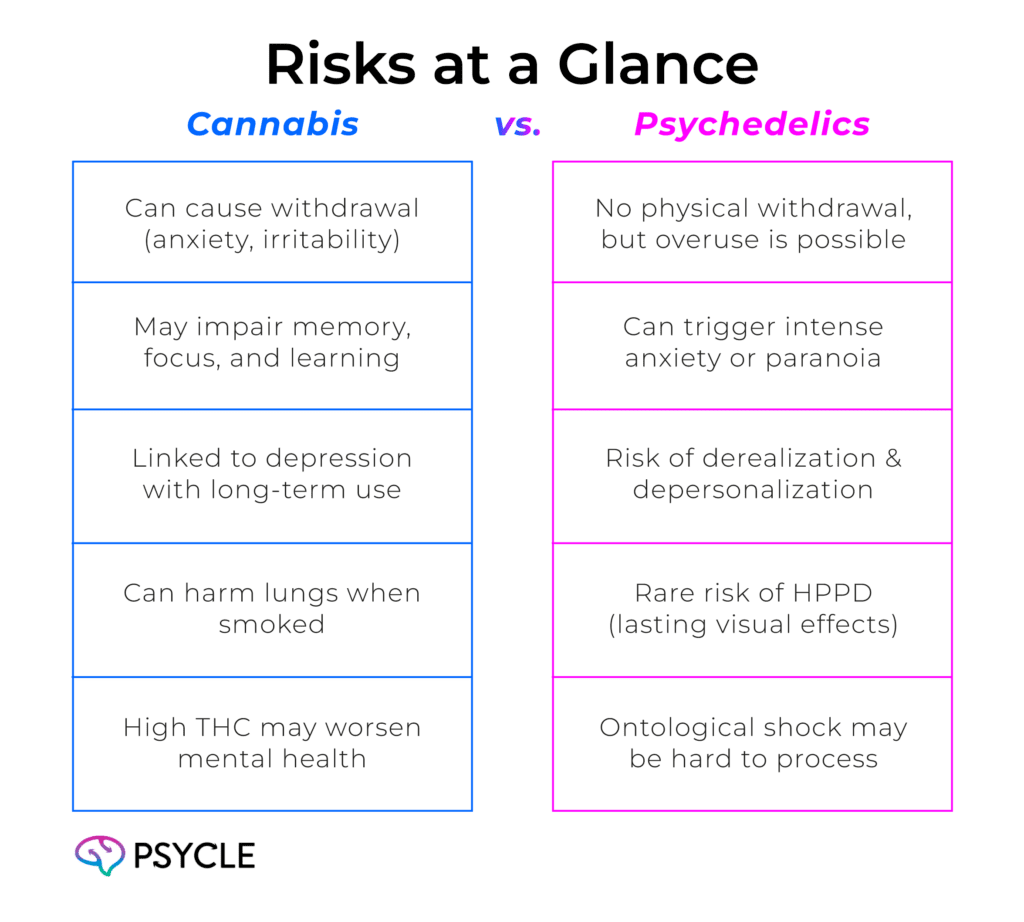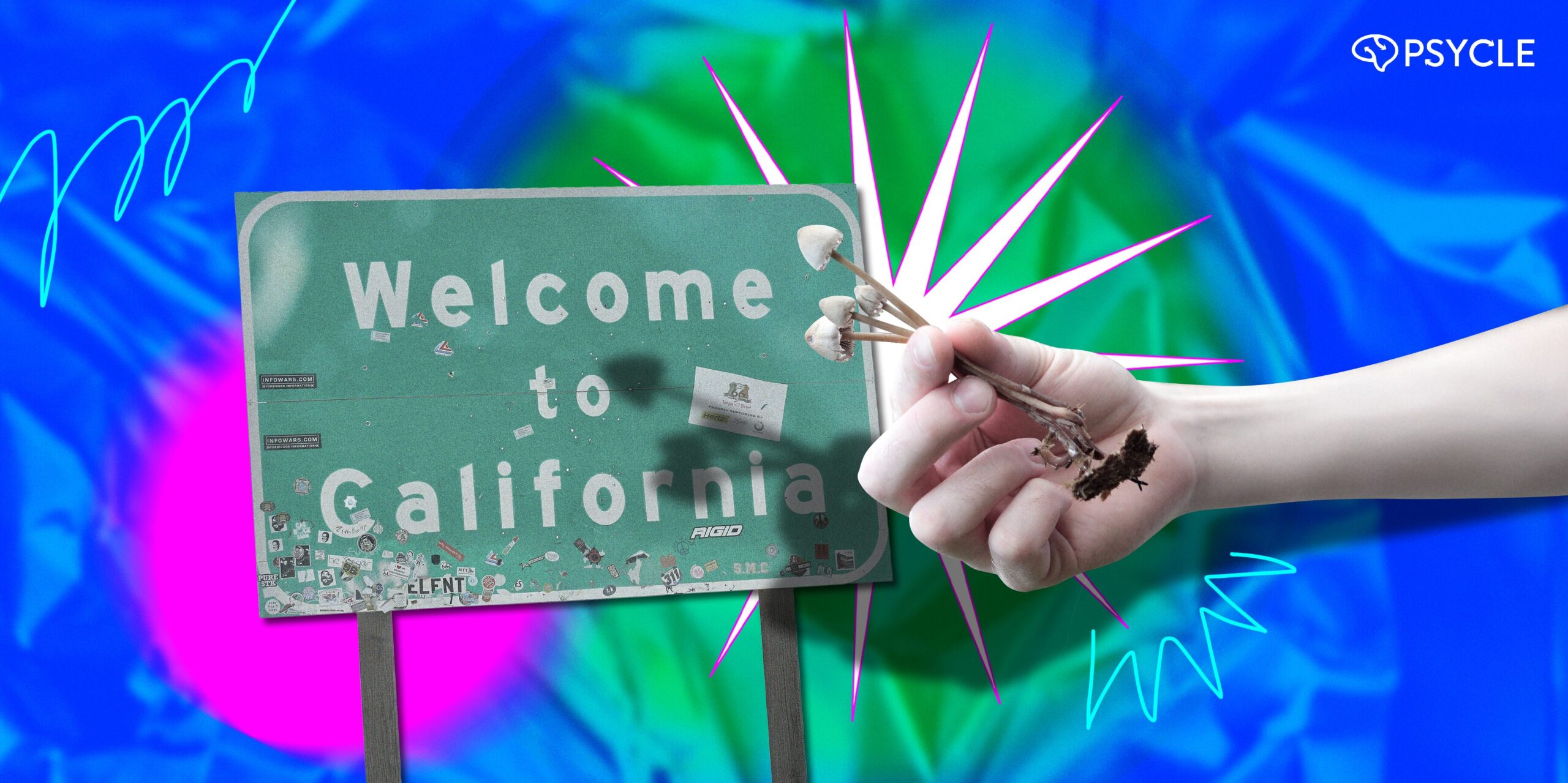More people are rethinking what it means to be sober. Instead of quitting all substances, some now skip alcohol and hard drugs but still use cannabis, or sometimes psychedelics. This lifestyle is called California Sober, and it represents a middle ground between abstinence and full use.
In this guide, you’ll learn what it means, why people choose it, and what you should know before trying it.
Key Takeaways
- California Sober means avoiding alcohol and hard drugs but allowing cannabis, and sometimes psychedelics.
- People choose this lifestyle for harm reduction, mental health support, and a sense of balance.
- Cannabis and psychedelics may carry fewer physical health risks than alcohol or opioids, but still have psychological risks.
- Cannabis can become habit-forming, and both cannabis and psychedelics can cause anxiety, paranoia, or lasting changes in perception.
- This approach may help some people manage past substance use, but it isn’t always safe for those with addiction or mental health risks.
- California Sober is flexible, but definitions vary. It’s essential to be clear about your own boundaries and motivations.
What Does California Sober Mean?
California Sober, or “Cali Sober,” usually means you stop using alcohol and hard drugs but still use cannabis. People often follow this lifestyle because cannabis feels less harmful and offers health benefits.
The meaning of Cali Sober can vary. Some people include psychedelics because they have low physical risks and may support mental health. This choice may be limited to natural psychedelics, like magic mushrooms or ayahuasca. Others may include lab-made psychedelics like LSD or 2C-B. A few even count drugs like ketamine or MDMA, which can be therapeutic when used in a controlled setting.
Origins of Cali Sober
Vice journalist Michelle Lhooq first popularized the term Cali Sober in mainstream media, in a 2019 article where she described giving up hard drugs after moving to California. “I decided to quit all drugs, including alcohol, except weed and psychedelics for a year,” she said. “I call this ‘Cali sober,’ a term some people also use when they quit everything but weed.” She was inspired by the slower pace of California life.
Both recreational and medical cannabis are legal in California. Psychedelics have also been decriminalized in various state cities, including Oakland and Santa Cruz. These legal frameworks within California, combined with the popularity of non-traditional healing, help explain why this type of sobriety is named after the state.
Public figures have helped spread the term. Singer-songwriter Demi Lovato brought major attention to California Sober in a 2021 documentary, where she described using cannabis and alcohol in moderation after a nearly fatal overdose. She also wrote a song called California Sober. The famous 80s popstar Billy Idol also claimed to be Cali Sober in an article for Rolling Stone.
Since then, other celebrities, recovery coaches, and influencers have mentioned going Cali Sober, each using the term in slightly different ways.
Why Choose a California Sober Lifestyle?
People often choose a Cali Sober lifestyle to avoid the harms linked to alcohol and hard drugs. For instance, alcohol is toxic to the liver, and regular use increases the risk of heart disease and cancer.
Alcohol or other class A drugs, such as methamphetamine, cocaine, and opioids, can also be highly addictive. If someone overdoses on these substances, it can cause severe damage to the body and even be fatal.
Cannabis and psychedelics, by comparison, cause fewer physical health problems than alcohol or hard drugs. They also have a much lower risk of overdose. A report from the Global Drug Survey found that alcohol, synthetic cannabis, and methamphetamines were the top causes of emergency hospital visits in 2017.
In contrast, natural cannabis and magic mushrooms were the least likely to send someone to the hospital. Opioids weren’t included in the comparison, but they have a markedly high risk for overdose and fatality.
Another reason for going Cali Sober is that people also feel more in control when they use cannabis or psychedelics instead of alcohol or hard drugs. They feel more aware of their actions, being less likely to take careless risks or say things they regret.
Importantly, cannabis and psychedelics both offer benefits that can enhance someone’s health and overall well-being.
Science-backed benefits of cannabis include:
- Relief from chronic pain
- Decreased anxiety (although cannabis can also increase anxiety)
- Decreased symptoms of post-traumatic stress disorder (PTSD)
- Lowering blood pressure
- Treating epilepsy
- Helping fight cancer
- Anti-inflammatory
Science-backed benefits of classical psychedelics (magic mushrooms, DMT, mescaline, and LSD) include:
- Treatment of various mental health disorders – including anxiety, depression, PTSD, eating disorders, and obsessive-compulsive disorder (OCD)
- Overcoming addiction
- Repairing brain damage caused by stroke
- Anti-inflammatory
Does California Sober Support Abstinence?
For some people, Cali Sober can support long-term recovery from problematic drug and alcohol use. They may feel more in control using cannabis instead of drinking or using harder drugs, since it tends to have less intense cravings. Psychedelics are generally non-addictive and have been used therapeutically to help people overcome substance abuse disorders.
However, others argue that Cali Sober can blur the line between recovery and relapse. Using cannabis or psychedelics might keep some people stuck in a cycle of escape, using these altered states to avoid dealing with difficult thoughts or emotions. Cannabis can also be habit-forming itself. One epidemiological study estimated that between 18 and 26% of people who use cannabis qualify for a cannabis use disorder.
What Are the Risks of Cali Sober Use?

Cannabis and psychedelics often cause fewer physical harms than alcohol or hard drugs, but they still carry serious risks when you use them regularly or in large amounts.
Cannabis Risks
- People can experience unpleasant withdrawal effects when coming off cannabis after a period of regular use. Cannabis withdrawal symptoms can include anxiety, restlessness, irritability, and night sweats.
- Regular use may impair memory, attention, and learning. In chronic users, these effects may persist despite periods of abstinence.
- Long-term regular cannabis use is associated with increased incidences of depression.
- Smoking cannabis can irritate the lungs, cause chronic coughing, and bronchitis.
- High‑THC products may trigger anxiety, paranoia, or psychosis, especially in those with mental health vulnerabilities.
Psychedelic Risks
- Psychedelics do not cause physical dependence, but people can still form habits of overuse.
- Short‑term effects may include intense anxiety, panic, paranoia, or disturbing changes in perception.
- Some people experience longer-lasting derealization and depersonalization, characterized by a feeling of being dissociated from their environment and sense of self. This can cause feelings of loneliness, confusion, and isolation.
- Hallucinogen Persisting Perception Disorder (HPPD) is a condition where individuals experience persistent visual and auditory distortions, even months or years after use.
- Ontological shock occurs when we experience a radical shift in our understanding of the universe, which can be challenging to comprehend or manage.
The risk of psychedelics increases if you have a history of a mental health disorder or if you use high doses in unsupervised settings.
Is California Sober Legal?
Even though more people now explore cannabis and psychedelics for health or personal growth, these substances remain illegal in many places. Cali Sober choices can lead to legal trouble, depending on where you are and what you use.
In the United States, cannabis laws vary by state. As of 2025, 24 states, including California, allow recreational use for adults. Over 30 others allow medical use with a doctor’s approval. Still, cannabis remains illegal under U.S. federal law. It’s classified as a Schedule I drug, meaning the government sees it as having no medical value and a high risk of abuse.
This creates risks if you cross state lines, travel by plane, or work in a federally regulated job. The government has proposed reclassifying it as a Schedule III substance, but the change is not yet final.
Psychedelics carry even more legal risk. Most psychedelics are illegal in most states and remain Schedule I substances under federal law. A few places have started to change this. Oregon now allows guided psilocybin therapy.
Colorado permits adults to use some natural psychedelics for personal healing. Cities like Denver, Oakland, and Santa Cruz have also decriminalized certain substances, meaning local police don’t prioritize arrests for personal use. However, for the most part, personal possession of psychedelics is a federal offense.
What Are the Alternatives to California Sober?
Cali Sober may not be suitable for everyone. If you have a mental health disorder, then you may be more likely to experience the harmful effects of cannabis and psychedelics. It’s also highly recommended that you avoid cannabis or psychedelics if you have a personal or family history of psychosis.
If you’re looking to change your relationship with alcohol and drugs, Cali Sober isn’t the only way.
One common alternative is the sober curious movement. This approach encourages you to explore how life feels without alcohol, even if you don’t entirely quit. You might avoid drinking during the week, take breaks from social drinking, or rethink why you drink in the first place. It’s not about strict rules but about making more mindful choices.
Another option is moderation programs. These programs help you set and follow personal limits. Some include therapy or support groups where people share tips on drinking less or using more safely. Tools like tracking apps or drink plans support this approach. Moderation works best for people who don’t meet the criteria for addiction but want to cut back.
Some people choose complete abstinence and avoid all substances. This can be a safer choice if you’re in recovery or have a family history of addiction. If you tend to form habits quickly, using cannabis or psychedelics might just replace one problem with another. In these cases, therapy and abstinence together may help you break the patterns that lead to substance use.
FAQs
Is it Possible to Get Addicted to Psychedelics?
Classic psychedelics like psilocybin, LSD, and DMT are not considered physically addictive. Most people do not crave them or develop a tolerance in the same way as with alcohol or opioids. However, they can still be misused and may cause lasting psychological effects in rare cases.
Can Cannabis or Psychedelics Help People With Substance Use Issues?
Some studies suggest cannabis can ease withdrawal symptoms or reduce cravings for alcohol or opioids. Psychedelics like psilocybin and ibogaine are being studied in clinical settings for their potential to support recovery. These treatments usually involve therapy and medical supervision. Using these substances without guidance or support may carry risks.
Sources
- https://www.theguardian.com/wellness/2024/apr/11/california-sober-meaning-marijuana
- https://www.globaldrugsurvey.com/wp-content/themes/globaldrugsurvey/results/GDS2017_key-findings-report_final.pdf
- https://www.ncbi.nlm.nih.gov/books/NBK538131/

